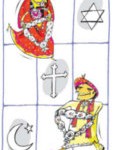By Dilip Amin, San Francisco, California
e-mail: dilipamin@yahoo.com      www.InterfaithShaadi.org
Dilip Amin is a scientist, former president of Plymouth Balvihar in Pennsylvania and a parent of two young adult children. He is passionate about educating people about interfaith marriages, has written fifteen articles, and co-authored a book.
 In the Western world, young adults date someone from other faiths during their college years. Therefore it should come as no surprise that in North America about a third of our young generation of Hindus (Jains and Sikhs as well) marry Christians, Jews and Muslims (Abrahamics). This trend is expected to rise in the years ahead.
In the Western world, young adults date someone from other faiths during their college years. Therefore it should come as no surprise that in North America about a third of our young generation of Hindus (Jains and Sikhs as well) marry Christians, Jews and Muslims (Abrahamics). This trend is expected to rise in the years ahead.
There is often a large gap between the expectations of Hindu parents and their children about the child’s choice of a life-mate, at least initially. Thus, where an Abrahamic life partner is selected, frequently, Hindu young adults decide without pre-emptive advice, guidance, or consultation with their parents.
It is safe to say that most Hindus are not sufficiently knowledgeable about the Abrahamic faiths and how they differ from the Hindu dharma. So, often they are not well equipped to guide their young adults in this critical transition, resulting in irrational arguments in homes.
In the predominantly first generation immigrant Hindu community, some parents whose child has not married yet, may smugly look at others whose child has a non-Hindu spouse without realizing that it could happen in their own home a few years down the road.
Interfaith marriages, we need to recognize, are a matter of chance, and do not necessarily reflect the Hindu religious training given in childhood. On the other side, parents with interfaith marriages in their homes are reluctant to share their experience of interacting with Abrahamic in-laws, resulting in loss of knowledge for the benefit of our community.
One of the critical questions that has to be addressed in any interfaith relationship is: What will be the religion of the children by this marriage? A Hindu must ask: Is there any expectation of religious “label†to be placed on the child(ren) by Baptism (Christian), Bris (Jewish) or Sunat (Islamic)?
Some other issues to address are: a) expectation of religious conversion of the Hindu groom/bride before marriage; b) first names of children; c) son’s circumcision for religious reason even though there is no medical consensus for recommending the procedure; and d) any reservation by the Abrahamic spouse to be a part of Hindu worship practice of pooja and the display of Hindu Ishwara icons in home. And finally, also on funeral rites of the non-Abrahamic spouse and children by this marriage.
Baptism, Bris or Sunat as a ritual is not an issue, but the thought process behind asking for it should be a concern. The Bible states more than thirty times that Lord their God is a Jealous and Angry God and will not tolerate praying to “other gods.†Are Lord Krishna and Goddess Laxmi other gods? Further, Christianity teaches that only their faithfuls will achieve salvation, and others will be condemned to hell on the Judgment Day, after the Second Coming of Christ in the future. Islam too has similar teachings. Does it mean Mahatma Gandhi will go to hell?
Not all Abrahamics impose their religious beliefs/practices on their non-Abrahamic spouses, but it is critical to find out facts sooner than later.
It is also important to recognize that despite all the potential marital pitfalls, a successful and fulfilling inter-religious marriage is possible. One effective way to achieve this is by not imposing one’s religious beliefs on the other partner.

